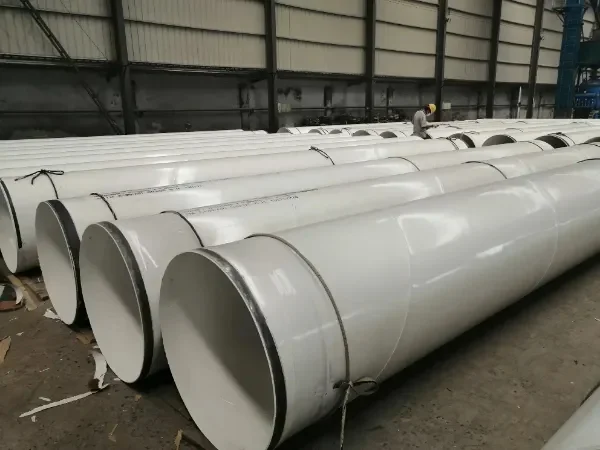The importance of anticorrosive coating to pipeline construction
Steel pipes with anti-corrosion coatings are widely used in various industries due to their excellent corrosion resistance properties. However, the connection of these pipes is equally important to ensure the overall integrity of the pipeline system. There are several ways to connect steel pipes with anti-corrosion coatings, each with its own advantages and disadvantages.
One of the most common ways to connect steel pipes is through welding. Welding involves melting the ends of two pipes and fusing them together to create a strong and permanent joint. This method is ideal for high-pressure applications and can withstand extreme temperatures. However, welding can be time-consuming and requires skilled labor. Additionally, the heat generated during welding can damage the anti-corrosion coating, leading to potential corrosion issues.

Corrosion is a major problem that affects the longevity and safety of pipelines. It is caused by the reaction of metal with the environment, leading to the degradation of the pipeline material. To prevent this, corrosion-resistant coatings are applied to the surface of the pipeline during construction. These coatings act as a barrier between the metal and the environment, preventing corrosion from occurring. The importance of corrosion-resistant coatings in pipeline construction cannot be overstated.
Firstly, corrosion-resistant coatings protect the pipeline from the harsh environment it is exposed to. Pipelines are often installed in areas with high humidity, saltwater, and other corrosive substances. Without a protective coating, the pipeline material would quickly deteriorate, leading to leaks and other safety hazards. Corrosion-resistant coatings provide a barrier that prevents the pipeline material from coming into contact with these substances, ensuring the longevity and safety of the pipeline.
Secondly, corrosion-resistant coatings reduce maintenance costs. Pipelines that are not protected by a corrosion-resistant coating require frequent maintenance and repairs. This can be costly and time-consuming, as the pipeline must be shut down and repaired. Corrosion-resistant coatings reduce the need for maintenance and repairs, saving time and money in the long run.
Thirdly, corrosion-resistant coatings improve the efficiency of the pipeline. Corrosion can cause blockages and reduce the flow of the pipeline. This can lead to decreased efficiency and increased energy consumption. Corrosion-resistant coatings prevent blockages and ensure that the pipeline operates at maximum efficiency.
In conclusion, the importance of corrosion-resistant coatings in pipeline construction cannot be overstated. They protect the pipeline from the harsh environment, reduce maintenance costs, and improve the efficiency of the pipeline. Without these coatings, pipelines would quickly deteriorate, leading to safety hazards and increased
Corrosion is a major problem that affects the longevity and safety of pipelines. It is caused by the reaction of metal with the environment, leading to the degradation of the pipeline material. To prevent this, corrosion-resistant coatings are applied to the surface of the pipeline during construction. These coatings act as a barrier between the metal and the environment, preventing corrosion from occurring. The importance of corrosion-resistant coatings in pipeline construction cannot be overstated.
Firstly, corrosion-resistant coatings protect the pipeline from the harsh environment it is exposed to. Pipelines are often installed in areas with high humidity, saltwater, and other corrosive substances. Without a protective coating, the pipeline material would quickly deteriorate, leading to leaks and other safety hazards. Corrosion-resistant coatings provide a barrier that prevents the pipeline material from coming into contact with these substances, ensuring the longevity and safety of the pipeline.
Secondly, corrosion-resistant coatings reduce maintenance costs. Pipelines that are not protected by a corrosion-resistant coating require frequent maintenance and repairs. This can be costly and time-consuming, as the pipeline must be shut down and repaired. Corrosion-resistant coatings reduce the need for maintenance and repairs, saving time and money in the long run.
Thirdly, corrosion-resistant coatings improve the efficiency of the pipeline. Corrosion can cause blockages and reduce the flow of the pipeline. This can lead to decreased efficiency and increased energy consumption. Corrosion-resistant coatings prevent blockages and ensure that the pipeline operates at maximum efficiency.
In conclusion, the importance of corrosion-resistant coatings in pipeline construction cannot be overstated. They protect the pipeline from the harsh environment, reduce maintenance costs, and improve the efficiency of the pipeline. Without these coatings, pipelines would quickly deteriorate, leading to safety hazards and increased costs. Therefore, it is essential that corrosion-resistant coatings are applied to pipelines during construction.
Connection mode of steel pipe with anticorrosive coating
How to choose the appropriate anticorrosive coating pipeline manufacturer?
Types and characteristics of anticorrosive coating pipeline
How to Distinguish the Quality of Anti-corrosion Coating Pipes
Classification and characteristics of anticorrosive coatings
The difference between insulated pipe and anticorrosive pipe
Method for testing the quality of anti-corrosion coatings on steel pipes






